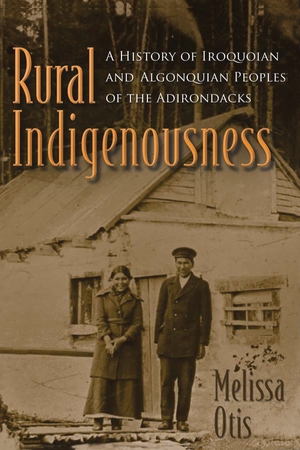Rural Indigenousness:
A History of Iroquoian and Algonquian Peoples of the Adirondacks
Rural Indigenousness is one of the few studies that examines the history of Indigenous people who stayed, or moved to, a rural area after contact. It is a microhistory that illuminates the rich history of Iroquoian and Algonquian peoples of the Adirondacks as an example of Indigenous people adapting to rural settler society, especially in the nineteenth century northeast, where their history was often erased by local historians. It illustrates the nuanced concept of “survivance” by Indigenous individuals and families within rural settler societies. This book emphasizes the importance of labor, class relations, and rural society to understand settler society history writ large.
This book argues that the Adirondack landscape was more than a hunting ground for nearby Native people; rather, it was a space of interaction where the land was woven into the fabric of their lives as an essential source of refuge and survival. It asks us to broaden our understanding of occupation and argues that hunting landscapes like the Adirondacks are complex. It introduces the term “location of exchange” which is defined as “a purposeful and occupied place where reciprocal acts occur, creating opportunities for entangled exchanges between people(s) and the land” and notes these acts between the people and the land are just as important, and maybe more so, as between peoples.
“Rural Indigenousness” is defined here as “an individual, or individuals, whose family history connects them to known Indigenous ancestry and a shared history with an Indigenous community, nation, or band. They have an understanding of self as an Indigenous person to the point that they express it in a personal profession of their identity to their rural community and to an Indigenous one, if it is available.” Their history should be reviewed alongside the better researched locations of reservation/reserve and urban Indigenous studies and histories.


“This deeply researched and compelling book reveals the centrality of Indigenous labour to the changing culture and history of the Adirondacks.”
The Journal of the Gilded Age and Progressive Era
“Otis has done an excellent job of crafting this narrative. This book promises to make a splash in Native American studies.”
Jon Parmenter, author of The Edge of the Woods: Iroquoia, 1534–1701

“Scholarly and popular histories alike have too often treated Native people as peripheral to the Adirondacks and the Adirondacks as peripheral to Native life. Melissa Otis puts that myth to rest, demonstrating that the Adirondacks have for centuries been an integral part of the Haudenosaunee and Abenaki homelands.”
James Rice, Walter S. Dickson Professor of History, Tufts University
“Otis’s Rural Indigenousness is a more comprehensive study of the relationship between Native Americans and the Adirondacks than we have seen to date. It shines a light on the rich history of Algonquian and Iroquoian people in the region and explores a variety of Native American experiences.”
The Adirondack Almanack
About the Author

Melissa Otis, PhD
Melissa Otis, PhD is the author of Rural Indigenousness: A History of Iroquoian and Algonquian Peoples of the Adirondacks published by Syracuse University Press (Dec. 2018), as well as several articles published in peer reviewed scholarly journals.
She received her doctorate from the University of Toronto in 2013 and thereafter completed a two–year postdoctoral fellowship at Carleton University in Ottawa. She and her husband returned to the Adirondacks in 2017 where they enjoy being close to Lake Champlain and the high peaks.
In the Adirondacks, Melissa has done consulting work for local museums, camps, and nonprofit organizations, including assisting with writing meaningful land acknowledgement statements. She’s currently working with the Adirondack Land Trust to help inform their decision-making as they consider Indigenous ownership and stewardship with regards to the land they own and manage.
In addition, Melissa worked with international students in the English as Second Language program at SUNY Plattsburgh. Over the COVID pandemic, she turned her attention to writing fiction and is enjoying the creative process.
More from the Author
Coming Soon!
-
Welcome to WordPress. This is your first post. Edit or delete it, then start writing!